Lincoln University College CM 2: Carbohydrate Metabolism Errors Report
VerifiedAdded on 2022/09/09
|12
|3301
|11
Report
AI Summary
This report provides a comprehensive overview of inborn errors of carbohydrate metabolism. It begins by defining carbohydrates and their importance, followed by a detailed discussion of various metabolic errors, including galactosemia, which is characterized by an inability to metabolize galactose; glycogen storage diseases (GSD), a group of genetic disorders affecting glycogen metabolism; pyruvate carboxylase deficiency, a metabolic disorder affecting energy production; fructose-1,6-bisphosphatase deficiency, which impairs gluconeogenesis; hereditary fructose intolerance (HFI), caused by a deficiency in fructose breakdown; and glucose-6-phosphate dehydrogenase deficiency, a genetic disorder affecting red blood cells. Each condition is described in terms of its underlying causes, symptoms, and potential treatments. The report emphasizes the importance of early diagnosis and management to mitigate the effects of these disorders. The report is well-researched and supported by multiple references. This report is an assignment from a student and is available on Desklib, a platform providing AI-based study tools.
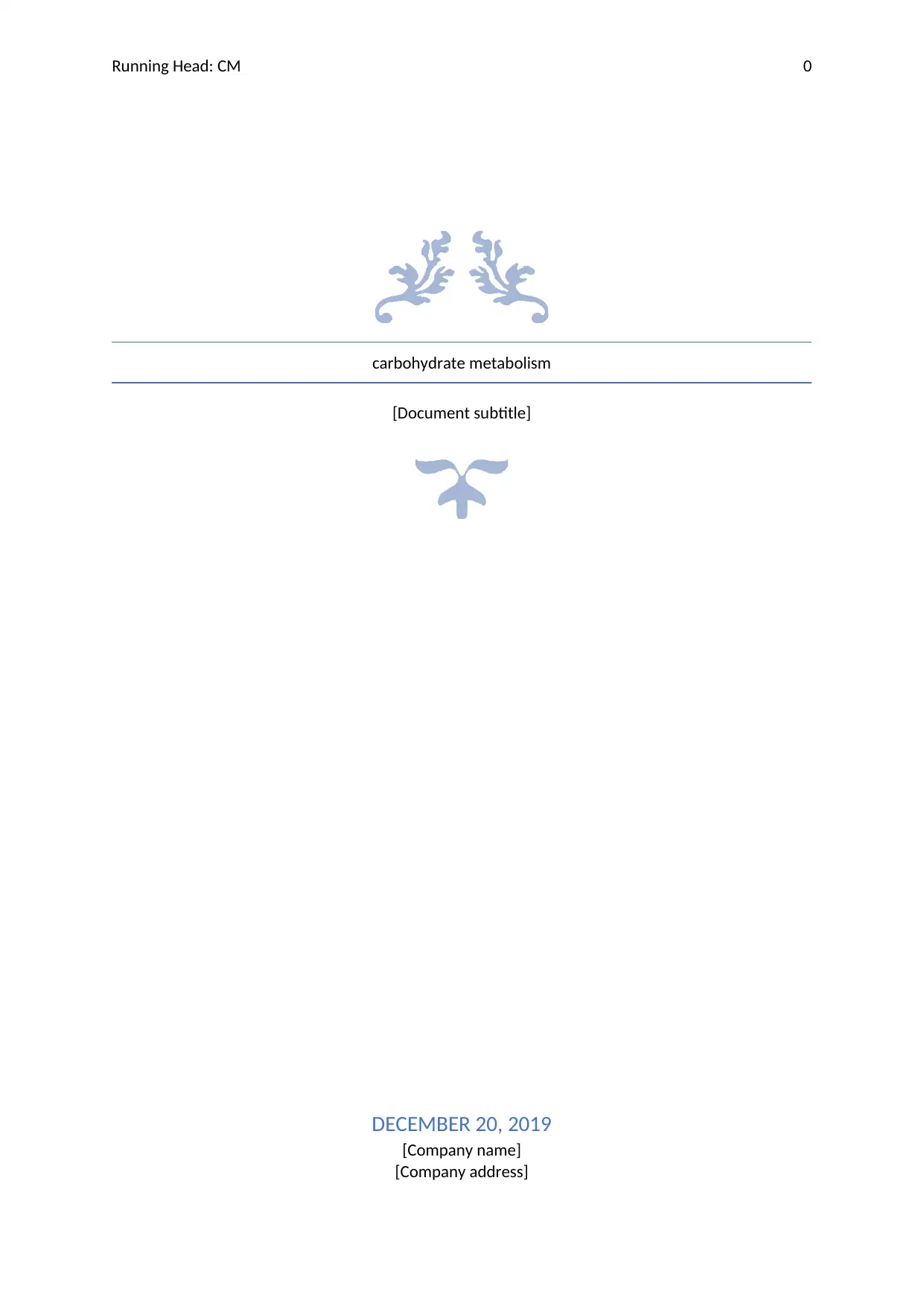
Running Head: CM 0
carbohydrate metabolism
[Document subtitle]
DECEMBER 20, 2019
[Company name]
[Company address]
carbohydrate metabolism
[Document subtitle]
DECEMBER 20, 2019
[Company name]
[Company address]
Paraphrase This Document
Need a fresh take? Get an instant paraphrase of this document with our AI Paraphraser
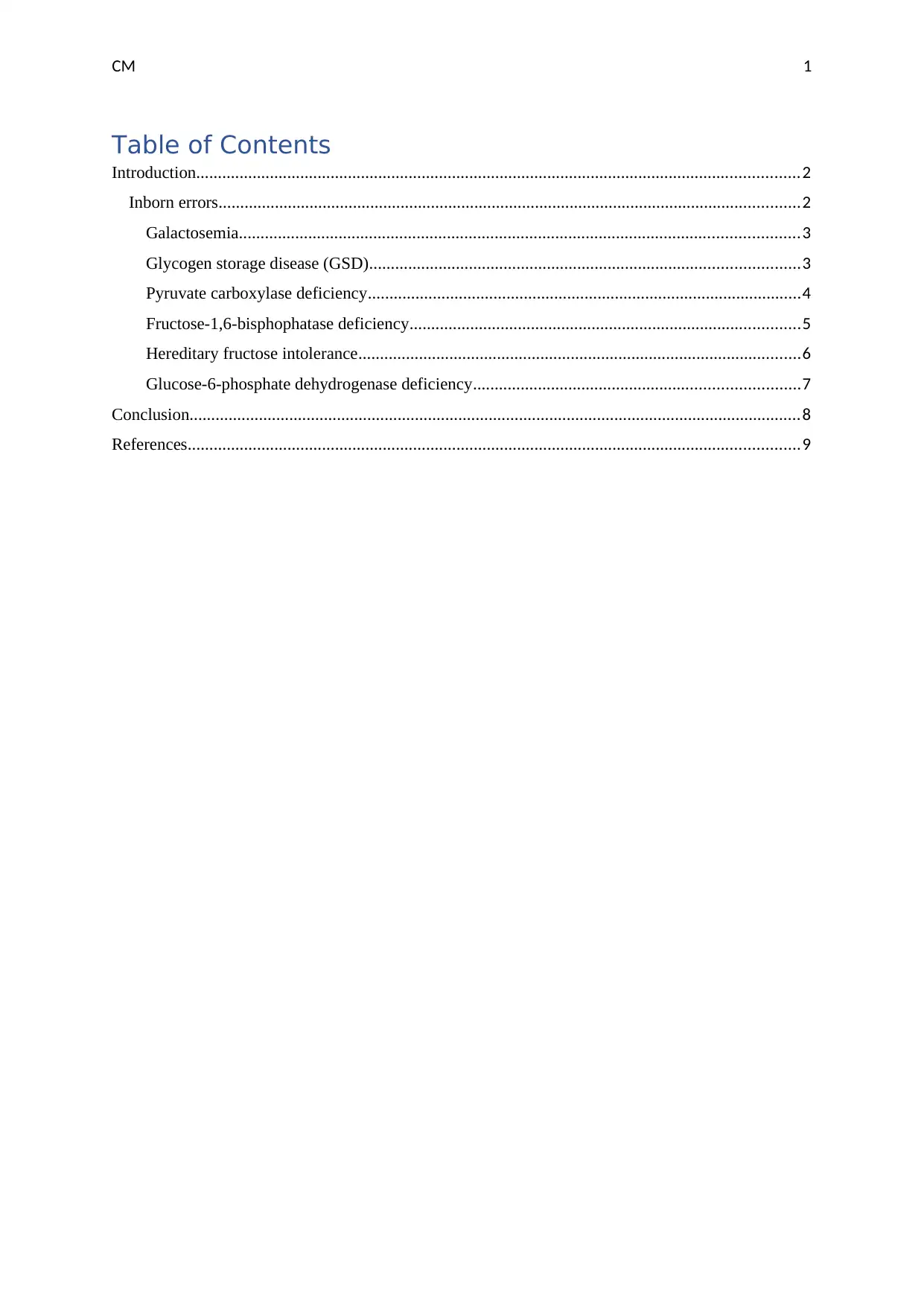
CM 1
Table of Contents
Introduction...........................................................................................................................................2
Inborn errors......................................................................................................................................2
Galactosemia.................................................................................................................................3
Glycogen storage disease (GSD)...................................................................................................3
Pyruvate carboxylase deficiency....................................................................................................4
Fructose-1,6-bisphophatase deficiency..........................................................................................5
Hereditary fructose intolerance......................................................................................................6
Glucose-6-phosphate dehydrogenase deficiency...........................................................................7
Conclusion.............................................................................................................................................8
References.............................................................................................................................................9
Table of Contents
Introduction...........................................................................................................................................2
Inborn errors......................................................................................................................................2
Galactosemia.................................................................................................................................3
Glycogen storage disease (GSD)...................................................................................................3
Pyruvate carboxylase deficiency....................................................................................................4
Fructose-1,6-bisphophatase deficiency..........................................................................................5
Hereditary fructose intolerance......................................................................................................6
Glucose-6-phosphate dehydrogenase deficiency...........................................................................7
Conclusion.............................................................................................................................................8
References.............................................................................................................................................9
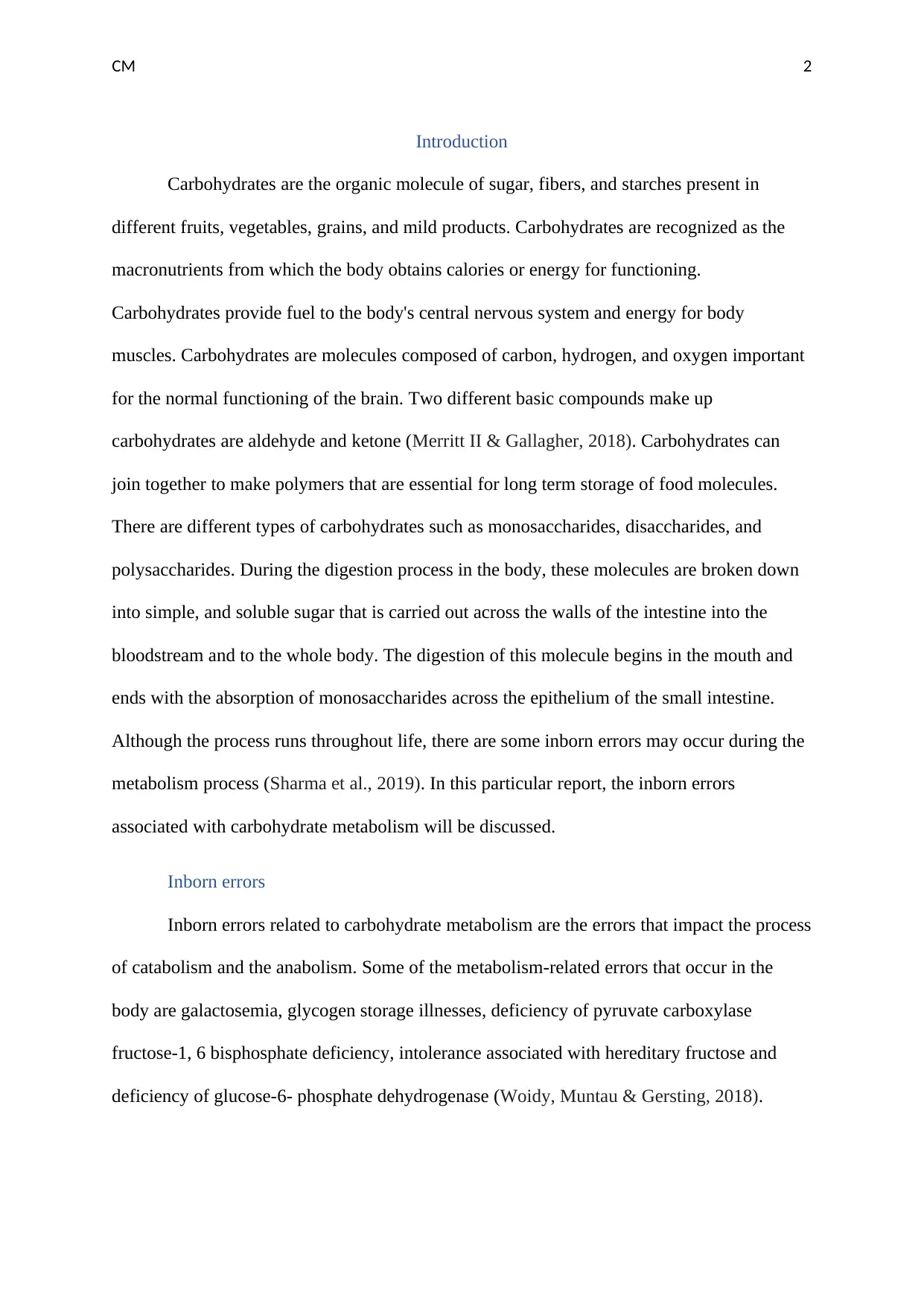
CM 2
Introduction
Carbohydrates are the organic molecule of sugar, fibers, and starches present in
different fruits, vegetables, grains, and mild products. Carbohydrates are recognized as the
macronutrients from which the body obtains calories or energy for functioning.
Carbohydrates provide fuel to the body's central nervous system and energy for body
muscles. Carbohydrates are molecules composed of carbon, hydrogen, and oxygen important
for the normal functioning of the brain. Two different basic compounds make up
carbohydrates are aldehyde and ketone (Merritt II & Gallagher, 2018). Carbohydrates can
join together to make polymers that are essential for long term storage of food molecules.
There are different types of carbohydrates such as monosaccharides, disaccharides, and
polysaccharides. During the digestion process in the body, these molecules are broken down
into simple, and soluble sugar that is carried out across the walls of the intestine into the
bloodstream and to the whole body. The digestion of this molecule begins in the mouth and
ends with the absorption of monosaccharides across the epithelium of the small intestine.
Although the process runs throughout life, there are some inborn errors may occur during the
metabolism process (Sharma et al., 2019). In this particular report, the inborn errors
associated with carbohydrate metabolism will be discussed.
Inborn errors
Inborn errors related to carbohydrate metabolism are the errors that impact the process
of catabolism and the anabolism. Some of the metabolism-related errors that occur in the
body are galactosemia, glycogen storage illnesses, deficiency of pyruvate carboxylase
fructose-1, 6 bisphosphate deficiency, intolerance associated with hereditary fructose and
deficiency of glucose-6- phosphate dehydrogenase (Woidy, Muntau & Gersting, 2018).
Introduction
Carbohydrates are the organic molecule of sugar, fibers, and starches present in
different fruits, vegetables, grains, and mild products. Carbohydrates are recognized as the
macronutrients from which the body obtains calories or energy for functioning.
Carbohydrates provide fuel to the body's central nervous system and energy for body
muscles. Carbohydrates are molecules composed of carbon, hydrogen, and oxygen important
for the normal functioning of the brain. Two different basic compounds make up
carbohydrates are aldehyde and ketone (Merritt II & Gallagher, 2018). Carbohydrates can
join together to make polymers that are essential for long term storage of food molecules.
There are different types of carbohydrates such as monosaccharides, disaccharides, and
polysaccharides. During the digestion process in the body, these molecules are broken down
into simple, and soluble sugar that is carried out across the walls of the intestine into the
bloodstream and to the whole body. The digestion of this molecule begins in the mouth and
ends with the absorption of monosaccharides across the epithelium of the small intestine.
Although the process runs throughout life, there are some inborn errors may occur during the
metabolism process (Sharma et al., 2019). In this particular report, the inborn errors
associated with carbohydrate metabolism will be discussed.
Inborn errors
Inborn errors related to carbohydrate metabolism are the errors that impact the process
of catabolism and the anabolism. Some of the metabolism-related errors that occur in the
body are galactosemia, glycogen storage illnesses, deficiency of pyruvate carboxylase
fructose-1, 6 bisphosphate deficiency, intolerance associated with hereditary fructose and
deficiency of glucose-6- phosphate dehydrogenase (Woidy, Muntau & Gersting, 2018).
⊘ This is a preview!⊘
Do you want full access?
Subscribe today to unlock all pages.

Trusted by 1+ million students worldwide
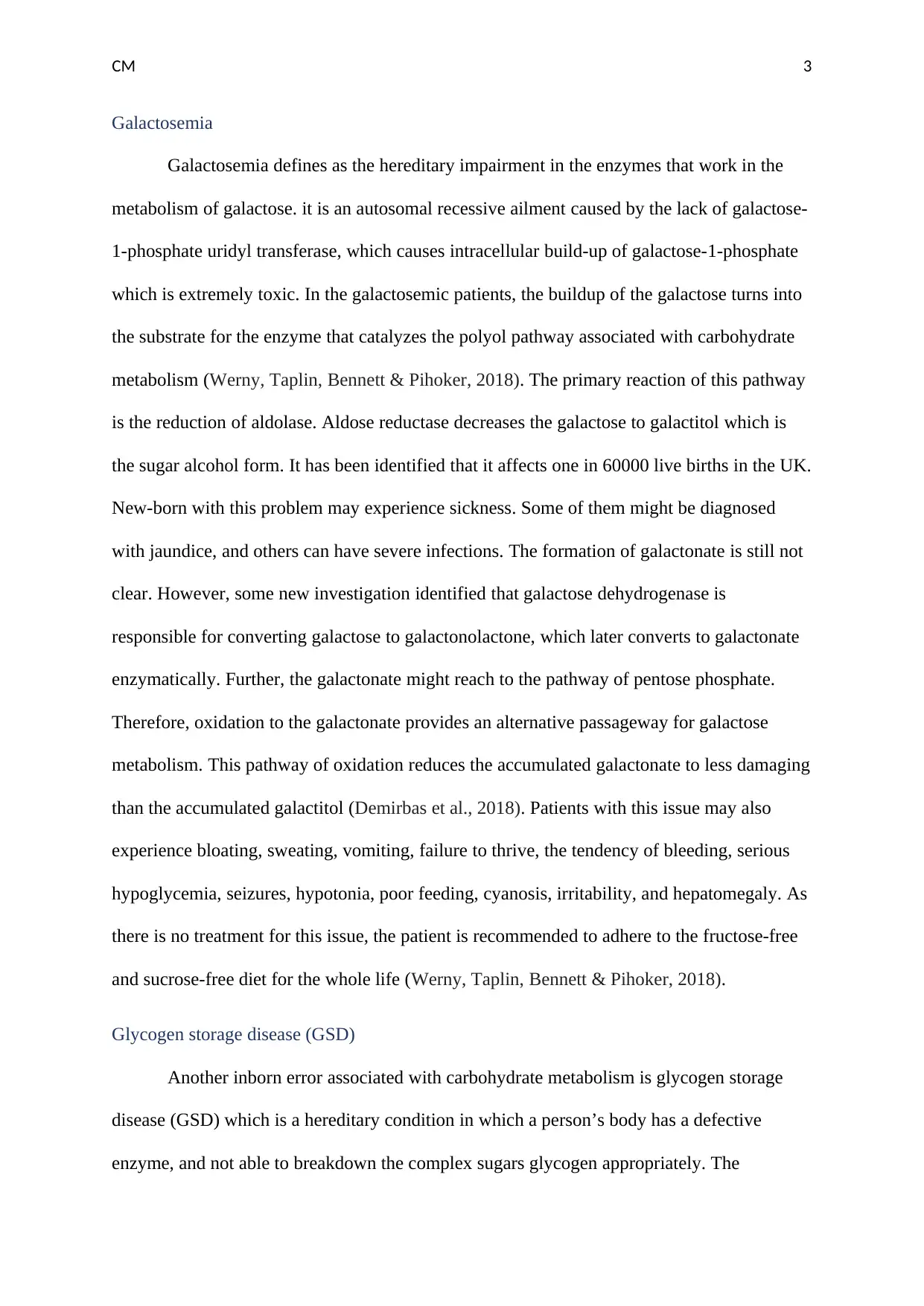
CM 3
Galactosemia
Galactosemia defines as the hereditary impairment in the enzymes that work in the
metabolism of galactose. it is an autosomal recessive ailment caused by the lack of galactose-
1-phosphate uridyl transferase, which causes intracellular build-up of galactose-1-phosphate
which is extremely toxic. In the galactosemic patients, the buildup of the galactose turns into
the substrate for the enzyme that catalyzes the polyol pathway associated with carbohydrate
metabolism (Werny, Taplin, Bennett & Pihoker, 2018). The primary reaction of this pathway
is the reduction of aldolase. Aldose reductase decreases the galactose to galactitol which is
the sugar alcohol form. It has been identified that it affects one in 60000 live births in the UK.
New-born with this problem may experience sickness. Some of them might be diagnosed
with jaundice, and others can have severe infections. The formation of galactonate is still not
clear. However, some new investigation identified that galactose dehydrogenase is
responsible for converting galactose to galactonolactone, which later converts to galactonate
enzymatically. Further, the galactonate might reach to the pathway of pentose phosphate.
Therefore, oxidation to the galactonate provides an alternative passageway for galactose
metabolism. This pathway of oxidation reduces the accumulated galactonate to less damaging
than the accumulated galactitol (Demirbas et al., 2018). Patients with this issue may also
experience bloating, sweating, vomiting, failure to thrive, the tendency of bleeding, serious
hypoglycemia, seizures, hypotonia, poor feeding, cyanosis, irritability, and hepatomegaly. As
there is no treatment for this issue, the patient is recommended to adhere to the fructose-free
and sucrose-free diet for the whole life (Werny, Taplin, Bennett & Pihoker, 2018).
Glycogen storage disease (GSD)
Another inborn error associated with carbohydrate metabolism is glycogen storage
disease (GSD) which is a hereditary condition in which a person’s body has a defective
enzyme, and not able to breakdown the complex sugars glycogen appropriately. The
Galactosemia
Galactosemia defines as the hereditary impairment in the enzymes that work in the
metabolism of galactose. it is an autosomal recessive ailment caused by the lack of galactose-
1-phosphate uridyl transferase, which causes intracellular build-up of galactose-1-phosphate
which is extremely toxic. In the galactosemic patients, the buildup of the galactose turns into
the substrate for the enzyme that catalyzes the polyol pathway associated with carbohydrate
metabolism (Werny, Taplin, Bennett & Pihoker, 2018). The primary reaction of this pathway
is the reduction of aldolase. Aldose reductase decreases the galactose to galactitol which is
the sugar alcohol form. It has been identified that it affects one in 60000 live births in the UK.
New-born with this problem may experience sickness. Some of them might be diagnosed
with jaundice, and others can have severe infections. The formation of galactonate is still not
clear. However, some new investigation identified that galactose dehydrogenase is
responsible for converting galactose to galactonolactone, which later converts to galactonate
enzymatically. Further, the galactonate might reach to the pathway of pentose phosphate.
Therefore, oxidation to the galactonate provides an alternative passageway for galactose
metabolism. This pathway of oxidation reduces the accumulated galactonate to less damaging
than the accumulated galactitol (Demirbas et al., 2018). Patients with this issue may also
experience bloating, sweating, vomiting, failure to thrive, the tendency of bleeding, serious
hypoglycemia, seizures, hypotonia, poor feeding, cyanosis, irritability, and hepatomegaly. As
there is no treatment for this issue, the patient is recommended to adhere to the fructose-free
and sucrose-free diet for the whole life (Werny, Taplin, Bennett & Pihoker, 2018).
Glycogen storage disease (GSD)
Another inborn error associated with carbohydrate metabolism is glycogen storage
disease (GSD) which is a hereditary condition in which a person’s body has a defective
enzyme, and not able to breakdown the complex sugars glycogen appropriately. The
Paraphrase This Document
Need a fresh take? Get an instant paraphrase of this document with our AI Paraphraser
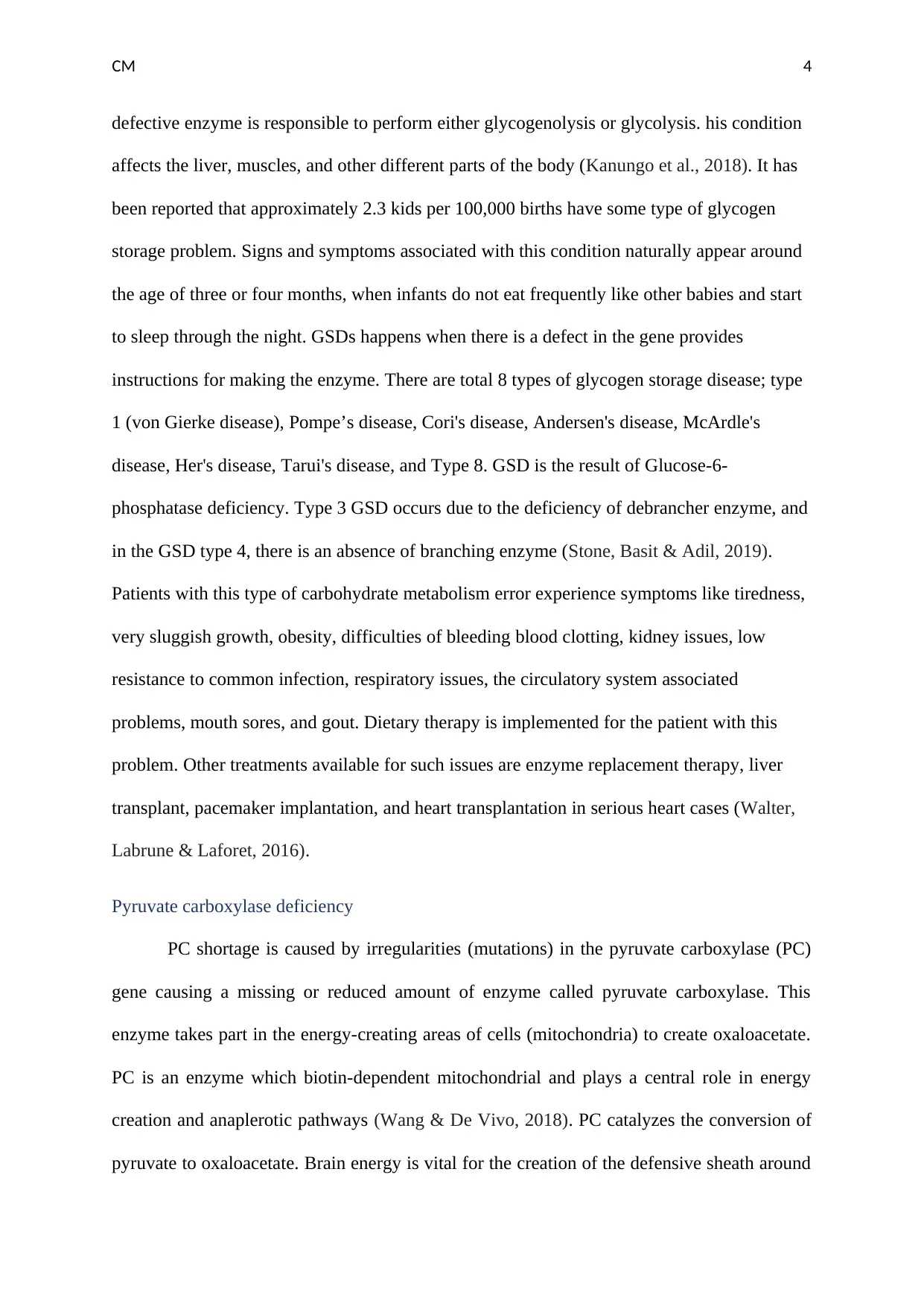
CM 4
defective enzyme is responsible to perform either glycogenolysis or glycolysis. his condition
affects the liver, muscles, and other different parts of the body (Kanungo et al., 2018). It has
been reported that approximately 2.3 kids per 100,000 births have some type of glycogen
storage problem. Signs and symptoms associated with this condition naturally appear around
the age of three or four months, when infants do not eat frequently like other babies and start
to sleep through the night. GSDs happens when there is a defect in the gene provides
instructions for making the enzyme. There are total 8 types of glycogen storage disease; type
1 (von Gierke disease), Pompe’s disease, Cori's disease, Andersen's disease, McArdle's
disease, Her's disease, Tarui's disease, and Type 8. GSD is the result of Glucose-6-
phosphatase deficiency. Type 3 GSD occurs due to the deficiency of debrancher enzyme, and
in the GSD type 4, there is an absence of branching enzyme (Stone, Basit & Adil, 2019).
Patients with this type of carbohydrate metabolism error experience symptoms like tiredness,
very sluggish growth, obesity, difficulties of bleeding blood clotting, kidney issues, low
resistance to common infection, respiratory issues, the circulatory system associated
problems, mouth sores, and gout. Dietary therapy is implemented for the patient with this
problem. Other treatments available for such issues are enzyme replacement therapy, liver
transplant, pacemaker implantation, and heart transplantation in serious heart cases (Walter,
Labrune & Laforet, 2016).
Pyruvate carboxylase deficiency
PC shortage is caused by irregularities (mutations) in the pyruvate carboxylase (PC)
gene causing a missing or reduced amount of enzyme called pyruvate carboxylase. This
enzyme takes part in the energy-creating areas of cells (mitochondria) to create oxaloacetate.
PC is an enzyme which biotin-dependent mitochondrial and plays a central role in energy
creation and anaplerotic pathways (Wang & De Vivo, 2018). PC catalyzes the conversion of
pyruvate to oxaloacetate. Brain energy is vital for the creation of the defensive sheath around
defective enzyme is responsible to perform either glycogenolysis or glycolysis. his condition
affects the liver, muscles, and other different parts of the body (Kanungo et al., 2018). It has
been reported that approximately 2.3 kids per 100,000 births have some type of glycogen
storage problem. Signs and symptoms associated with this condition naturally appear around
the age of three or four months, when infants do not eat frequently like other babies and start
to sleep through the night. GSDs happens when there is a defect in the gene provides
instructions for making the enzyme. There are total 8 types of glycogen storage disease; type
1 (von Gierke disease), Pompe’s disease, Cori's disease, Andersen's disease, McArdle's
disease, Her's disease, Tarui's disease, and Type 8. GSD is the result of Glucose-6-
phosphatase deficiency. Type 3 GSD occurs due to the deficiency of debrancher enzyme, and
in the GSD type 4, there is an absence of branching enzyme (Stone, Basit & Adil, 2019).
Patients with this type of carbohydrate metabolism error experience symptoms like tiredness,
very sluggish growth, obesity, difficulties of bleeding blood clotting, kidney issues, low
resistance to common infection, respiratory issues, the circulatory system associated
problems, mouth sores, and gout. Dietary therapy is implemented for the patient with this
problem. Other treatments available for such issues are enzyme replacement therapy, liver
transplant, pacemaker implantation, and heart transplantation in serious heart cases (Walter,
Labrune & Laforet, 2016).
Pyruvate carboxylase deficiency
PC shortage is caused by irregularities (mutations) in the pyruvate carboxylase (PC)
gene causing a missing or reduced amount of enzyme called pyruvate carboxylase. This
enzyme takes part in the energy-creating areas of cells (mitochondria) to create oxaloacetate.
PC is an enzyme which biotin-dependent mitochondrial and plays a central role in energy
creation and anaplerotic pathways (Wang & De Vivo, 2018). PC catalyzes the conversion of
pyruvate to oxaloacetate. Brain energy is vital for the creation of the defensive sheath around
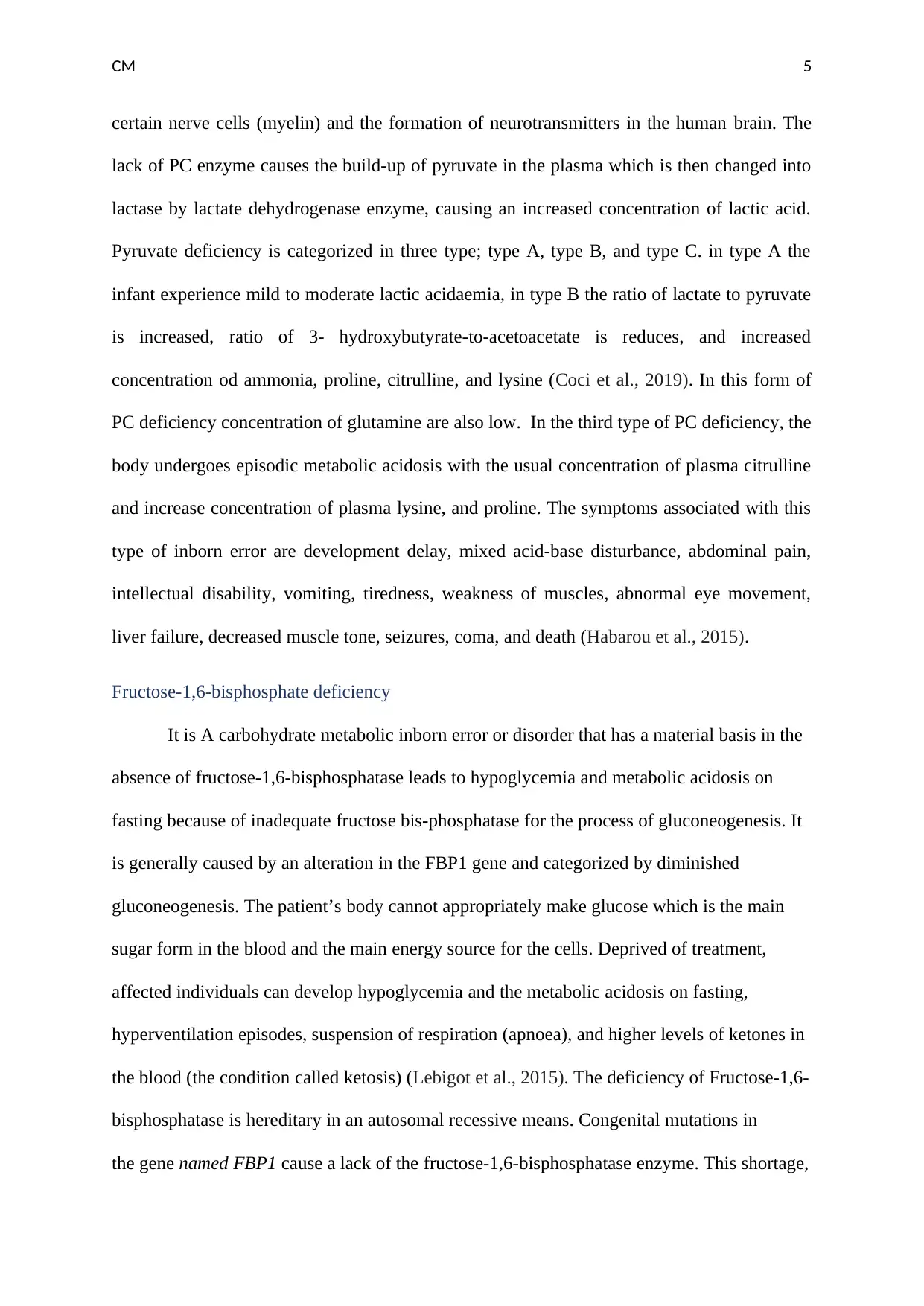
CM 5
certain nerve cells (myelin) and the formation of neurotransmitters in the human brain. The
lack of PC enzyme causes the build-up of pyruvate in the plasma which is then changed into
lactase by lactate dehydrogenase enzyme, causing an increased concentration of lactic acid.
Pyruvate deficiency is categorized in three type; type A, type B, and type C. in type A the
infant experience mild to moderate lactic acidaemia, in type B the ratio of lactate to pyruvate
is increased, ratio of 3- hydroxybutyrate-to-acetoacetate is reduces, and increased
concentration od ammonia, proline, citrulline, and lysine (Coci et al., 2019). In this form of
PC deficiency concentration of glutamine are also low. In the third type of PC deficiency, the
body undergoes episodic metabolic acidosis with the usual concentration of plasma citrulline
and increase concentration of plasma lysine, and proline. The symptoms associated with this
type of inborn error are development delay, mixed acid-base disturbance, abdominal pain,
intellectual disability, vomiting, tiredness, weakness of muscles, abnormal eye movement,
liver failure, decreased muscle tone, seizures, coma, and death (Habarou et al., 2015).
Fructose-1,6-bisphosphate deficiency
It is A carbohydrate metabolic inborn error or disorder that has a material basis in the
absence of fructose-1,6-bisphosphatase leads to hypoglycemia and metabolic acidosis on
fasting because of inadequate fructose bis-phosphatase for the process of gluconeogenesis. It
is generally caused by an alteration in the FBP1 gene and categorized by diminished
gluconeogenesis. The patient’s body cannot appropriately make glucose which is the main
sugar form in the blood and the main energy source for the cells. Deprived of treatment,
affected individuals can develop hypoglycemia and the metabolic acidosis on fasting,
hyperventilation episodes, suspension of respiration (apnoea), and higher levels of ketones in
the blood (the condition called ketosis) (Lebigot et al., 2015). The deficiency of Fructose-1,6-
bisphosphatase is hereditary in an autosomal recessive means. Congenital mutations in
the gene named FBP1 cause a lack of the fructose-1,6-bisphosphatase enzyme. This shortage,
certain nerve cells (myelin) and the formation of neurotransmitters in the human brain. The
lack of PC enzyme causes the build-up of pyruvate in the plasma which is then changed into
lactase by lactate dehydrogenase enzyme, causing an increased concentration of lactic acid.
Pyruvate deficiency is categorized in three type; type A, type B, and type C. in type A the
infant experience mild to moderate lactic acidaemia, in type B the ratio of lactate to pyruvate
is increased, ratio of 3- hydroxybutyrate-to-acetoacetate is reduces, and increased
concentration od ammonia, proline, citrulline, and lysine (Coci et al., 2019). In this form of
PC deficiency concentration of glutamine are also low. In the third type of PC deficiency, the
body undergoes episodic metabolic acidosis with the usual concentration of plasma citrulline
and increase concentration of plasma lysine, and proline. The symptoms associated with this
type of inborn error are development delay, mixed acid-base disturbance, abdominal pain,
intellectual disability, vomiting, tiredness, weakness of muscles, abnormal eye movement,
liver failure, decreased muscle tone, seizures, coma, and death (Habarou et al., 2015).
Fructose-1,6-bisphosphate deficiency
It is A carbohydrate metabolic inborn error or disorder that has a material basis in the
absence of fructose-1,6-bisphosphatase leads to hypoglycemia and metabolic acidosis on
fasting because of inadequate fructose bis-phosphatase for the process of gluconeogenesis. It
is generally caused by an alteration in the FBP1 gene and categorized by diminished
gluconeogenesis. The patient’s body cannot appropriately make glucose which is the main
sugar form in the blood and the main energy source for the cells. Deprived of treatment,
affected individuals can develop hypoglycemia and the metabolic acidosis on fasting,
hyperventilation episodes, suspension of respiration (apnoea), and higher levels of ketones in
the blood (the condition called ketosis) (Lebigot et al., 2015). The deficiency of Fructose-1,6-
bisphosphatase is hereditary in an autosomal recessive means. Congenital mutations in
the gene named FBP1 cause a lack of the fructose-1,6-bisphosphatase enzyme. This shortage,
⊘ This is a preview!⊘
Do you want full access?
Subscribe today to unlock all pages.

Trusted by 1+ million students worldwide
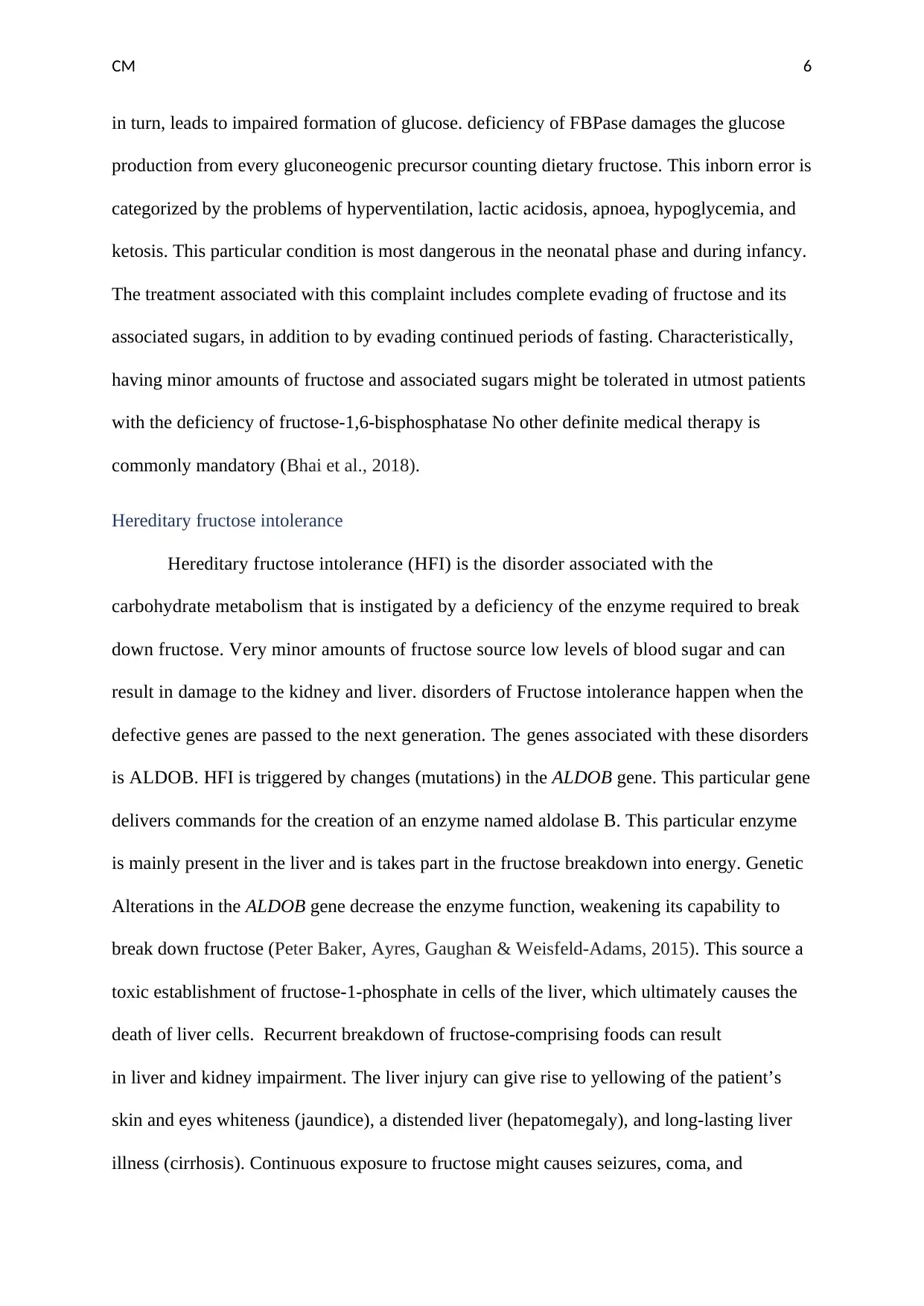
CM 6
in turn, leads to impaired formation of glucose. deficiency of FBPase damages the glucose
production from every gluconeogenic precursor counting dietary fructose. This inborn error is
categorized by the problems of hyperventilation, lactic acidosis, apnoea, hypoglycemia, and
ketosis. This particular condition is most dangerous in the neonatal phase and during infancy.
The treatment associated with this complaint includes complete evading of fructose and its
associated sugars, in addition to by evading continued periods of fasting. Characteristically,
having minor amounts of fructose and associated sugars might be tolerated in utmost patients
with the deficiency of fructose-1,6-bisphosphatase No other definite medical therapy is
commonly mandatory (Bhai et al., 2018).
Hereditary fructose intolerance
Hereditary fructose intolerance (HFI) is the disorder associated with the
carbohydrate metabolism that is instigated by a deficiency of the enzyme required to break
down fructose. Very minor amounts of fructose source low levels of blood sugar and can
result in damage to the kidney and liver. disorders of Fructose intolerance happen when the
defective genes are passed to the next generation. The genes associated with these disorders
is ALDOB. HFI is triggered by changes (mutations) in the ALDOB gene. This particular gene
delivers commands for the creation of an enzyme named aldolase B. This particular enzyme
is mainly present in the liver and is takes part in the fructose breakdown into energy. Genetic
Alterations in the ALDOB gene decrease the enzyme function, weakening its capability to
break down fructose (Peter Baker, Ayres, Gaughan & Weisfeld-Adams, 2015). This source a
toxic establishment of fructose-1-phosphate in cells of the liver, which ultimately causes the
death of liver cells. Recurrent breakdown of fructose-comprising foods can result
in liver and kidney impairment. The liver injury can give rise to yellowing of the patient’s
skin and eyes whiteness (jaundice), a distended liver (hepatomegaly), and long-lasting liver
illness (cirrhosis). Continuous exposure to fructose might causes seizures, coma, and
in turn, leads to impaired formation of glucose. deficiency of FBPase damages the glucose
production from every gluconeogenic precursor counting dietary fructose. This inborn error is
categorized by the problems of hyperventilation, lactic acidosis, apnoea, hypoglycemia, and
ketosis. This particular condition is most dangerous in the neonatal phase and during infancy.
The treatment associated with this complaint includes complete evading of fructose and its
associated sugars, in addition to by evading continued periods of fasting. Characteristically,
having minor amounts of fructose and associated sugars might be tolerated in utmost patients
with the deficiency of fructose-1,6-bisphosphatase No other definite medical therapy is
commonly mandatory (Bhai et al., 2018).
Hereditary fructose intolerance
Hereditary fructose intolerance (HFI) is the disorder associated with the
carbohydrate metabolism that is instigated by a deficiency of the enzyme required to break
down fructose. Very minor amounts of fructose source low levels of blood sugar and can
result in damage to the kidney and liver. disorders of Fructose intolerance happen when the
defective genes are passed to the next generation. The genes associated with these disorders
is ALDOB. HFI is triggered by changes (mutations) in the ALDOB gene. This particular gene
delivers commands for the creation of an enzyme named aldolase B. This particular enzyme
is mainly present in the liver and is takes part in the fructose breakdown into energy. Genetic
Alterations in the ALDOB gene decrease the enzyme function, weakening its capability to
break down fructose (Peter Baker, Ayres, Gaughan & Weisfeld-Adams, 2015). This source a
toxic establishment of fructose-1-phosphate in cells of the liver, which ultimately causes the
death of liver cells. Recurrent breakdown of fructose-comprising foods can result
in liver and kidney impairment. The liver injury can give rise to yellowing of the patient’s
skin and eyes whiteness (jaundice), a distended liver (hepatomegaly), and long-lasting liver
illness (cirrhosis). Continuous exposure to fructose might causes seizures, coma, and
Paraphrase This Document
Need a fresh take? Get an instant paraphrase of this document with our AI Paraphraser
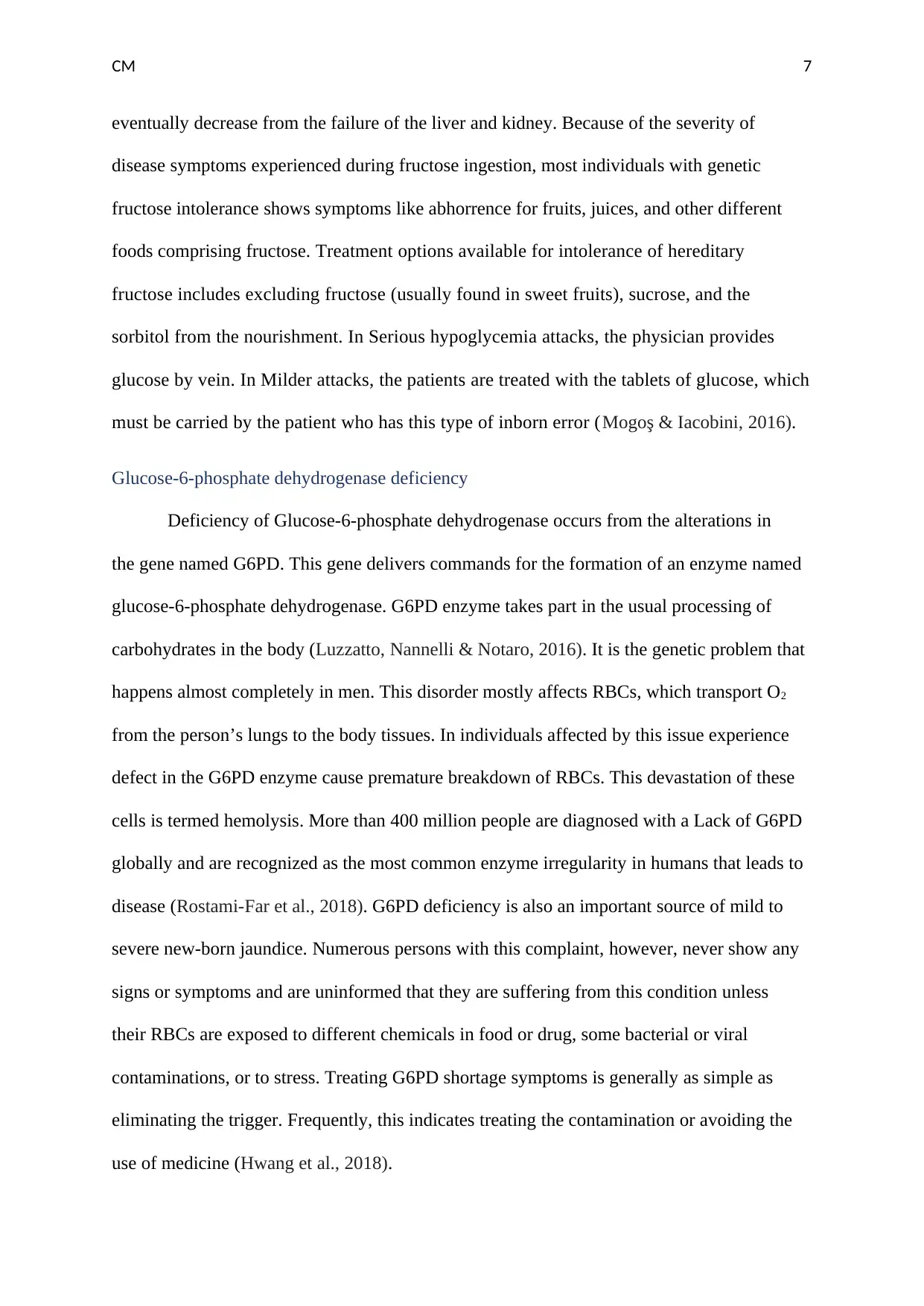
CM 7
eventually decrease from the failure of the liver and kidney. Because of the severity of
disease symptoms experienced during fructose ingestion, most individuals with genetic
fructose intolerance shows symptoms like abhorrence for fruits, juices, and other different
foods comprising fructose. Treatment options available for intolerance of hereditary
fructose includes excluding fructose (usually found in sweet fruits), sucrose, and the
sorbitol from the nourishment. In Serious hypoglycemia attacks, the physician provides
glucose by vein. In Milder attacks, the patients are treated with the tablets of glucose, which
must be carried by the patient who has this type of inborn error (Mogoş & Iacobini, 2016).
Glucose-6-phosphate dehydrogenase deficiency
Deficiency of Glucose-6-phosphate dehydrogenase occurs from the alterations in
the gene named G6PD. This gene delivers commands for the formation of an enzyme named
glucose-6-phosphate dehydrogenase. G6PD enzyme takes part in the usual processing of
carbohydrates in the body (Luzzatto, Nannelli & Notaro, 2016). It is the genetic problem that
happens almost completely in men. This disorder mostly affects RBCs, which transport O2
from the person’s lungs to the body tissues. In individuals affected by this issue experience
defect in the G6PD enzyme cause premature breakdown of RBCs. This devastation of these
cells is termed hemolysis. More than 400 million people are diagnosed with a Lack of G6PD
globally and are recognized as the most common enzyme irregularity in humans that leads to
disease (Rostami-Far et al., 2018). G6PD deficiency is also an important source of mild to
severe new-born jaundice. Numerous persons with this complaint, however, never show any
signs or symptoms and are uninformed that they are suffering from this condition unless
their RBCs are exposed to different chemicals in food or drug, some bacterial or viral
contaminations, or to stress. Treating G6PD shortage symptoms is generally as simple as
eliminating the trigger. Frequently, this indicates treating the contamination or avoiding the
use of medicine (Hwang et al., 2018).
eventually decrease from the failure of the liver and kidney. Because of the severity of
disease symptoms experienced during fructose ingestion, most individuals with genetic
fructose intolerance shows symptoms like abhorrence for fruits, juices, and other different
foods comprising fructose. Treatment options available for intolerance of hereditary
fructose includes excluding fructose (usually found in sweet fruits), sucrose, and the
sorbitol from the nourishment. In Serious hypoglycemia attacks, the physician provides
glucose by vein. In Milder attacks, the patients are treated with the tablets of glucose, which
must be carried by the patient who has this type of inborn error (Mogoş & Iacobini, 2016).
Glucose-6-phosphate dehydrogenase deficiency
Deficiency of Glucose-6-phosphate dehydrogenase occurs from the alterations in
the gene named G6PD. This gene delivers commands for the formation of an enzyme named
glucose-6-phosphate dehydrogenase. G6PD enzyme takes part in the usual processing of
carbohydrates in the body (Luzzatto, Nannelli & Notaro, 2016). It is the genetic problem that
happens almost completely in men. This disorder mostly affects RBCs, which transport O2
from the person’s lungs to the body tissues. In individuals affected by this issue experience
defect in the G6PD enzyme cause premature breakdown of RBCs. This devastation of these
cells is termed hemolysis. More than 400 million people are diagnosed with a Lack of G6PD
globally and are recognized as the most common enzyme irregularity in humans that leads to
disease (Rostami-Far et al., 2018). G6PD deficiency is also an important source of mild to
severe new-born jaundice. Numerous persons with this complaint, however, never show any
signs or symptoms and are uninformed that they are suffering from this condition unless
their RBCs are exposed to different chemicals in food or drug, some bacterial or viral
contaminations, or to stress. Treating G6PD shortage symptoms is generally as simple as
eliminating the trigger. Frequently, this indicates treating the contamination or avoiding the
use of medicine (Hwang et al., 2018).
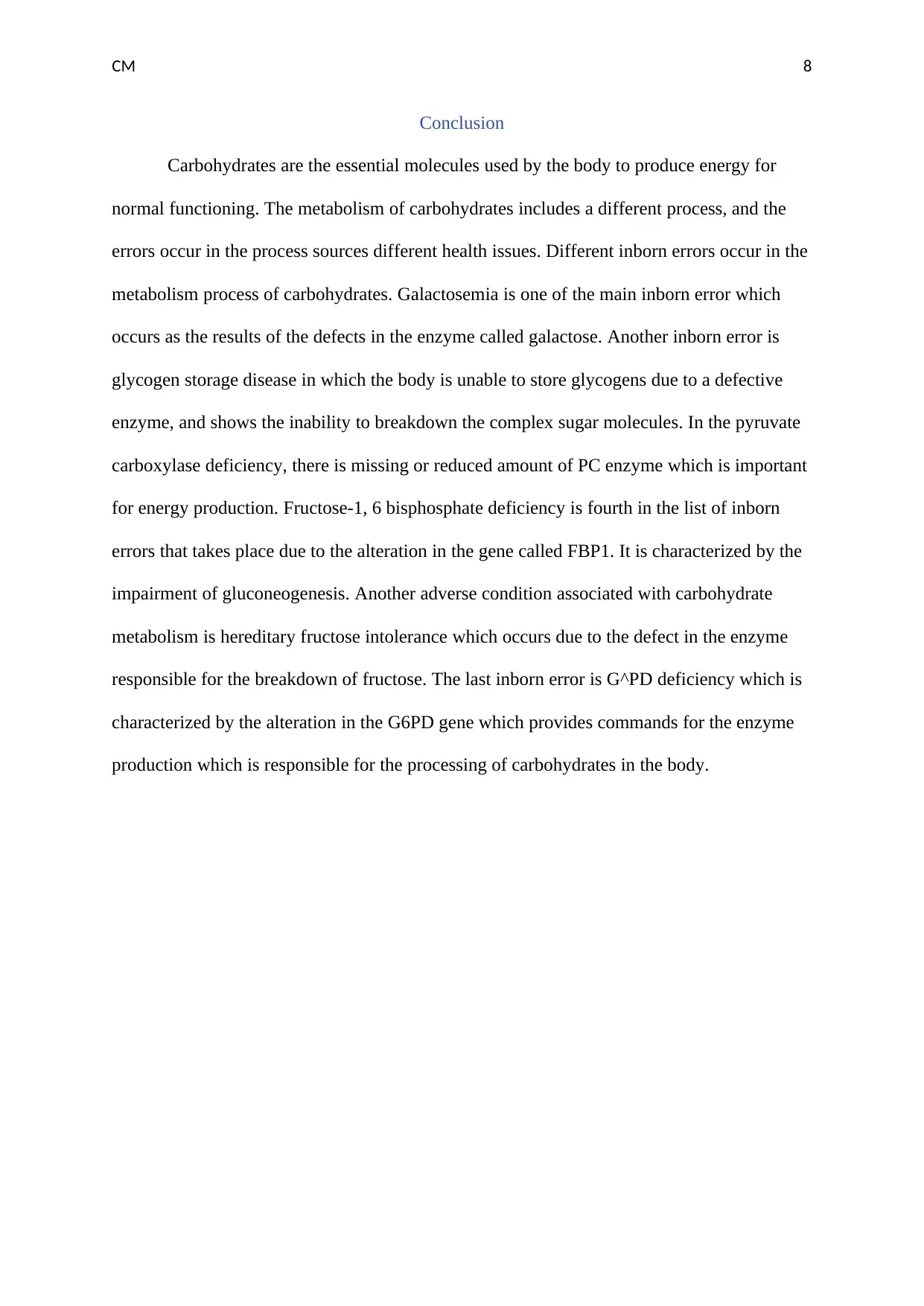
CM 8
Conclusion
Carbohydrates are the essential molecules used by the body to produce energy for
normal functioning. The metabolism of carbohydrates includes a different process, and the
errors occur in the process sources different health issues. Different inborn errors occur in the
metabolism process of carbohydrates. Galactosemia is one of the main inborn error which
occurs as the results of the defects in the enzyme called galactose. Another inborn error is
glycogen storage disease in which the body is unable to store glycogens due to a defective
enzyme, and shows the inability to breakdown the complex sugar molecules. In the pyruvate
carboxylase deficiency, there is missing or reduced amount of PC enzyme which is important
for energy production. Fructose-1, 6 bisphosphate deficiency is fourth in the list of inborn
errors that takes place due to the alteration in the gene called FBP1. It is characterized by the
impairment of gluconeogenesis. Another adverse condition associated with carbohydrate
metabolism is hereditary fructose intolerance which occurs due to the defect in the enzyme
responsible for the breakdown of fructose. The last inborn error is G^PD deficiency which is
characterized by the alteration in the G6PD gene which provides commands for the enzyme
production which is responsible for the processing of carbohydrates in the body.
Conclusion
Carbohydrates are the essential molecules used by the body to produce energy for
normal functioning. The metabolism of carbohydrates includes a different process, and the
errors occur in the process sources different health issues. Different inborn errors occur in the
metabolism process of carbohydrates. Galactosemia is one of the main inborn error which
occurs as the results of the defects in the enzyme called galactose. Another inborn error is
glycogen storage disease in which the body is unable to store glycogens due to a defective
enzyme, and shows the inability to breakdown the complex sugar molecules. In the pyruvate
carboxylase deficiency, there is missing or reduced amount of PC enzyme which is important
for energy production. Fructose-1, 6 bisphosphate deficiency is fourth in the list of inborn
errors that takes place due to the alteration in the gene called FBP1. It is characterized by the
impairment of gluconeogenesis. Another adverse condition associated with carbohydrate
metabolism is hereditary fructose intolerance which occurs due to the defect in the enzyme
responsible for the breakdown of fructose. The last inborn error is G^PD deficiency which is
characterized by the alteration in the G6PD gene which provides commands for the enzyme
production which is responsible for the processing of carbohydrates in the body.
⊘ This is a preview!⊘
Do you want full access?
Subscribe today to unlock all pages.

Trusted by 1+ million students worldwide
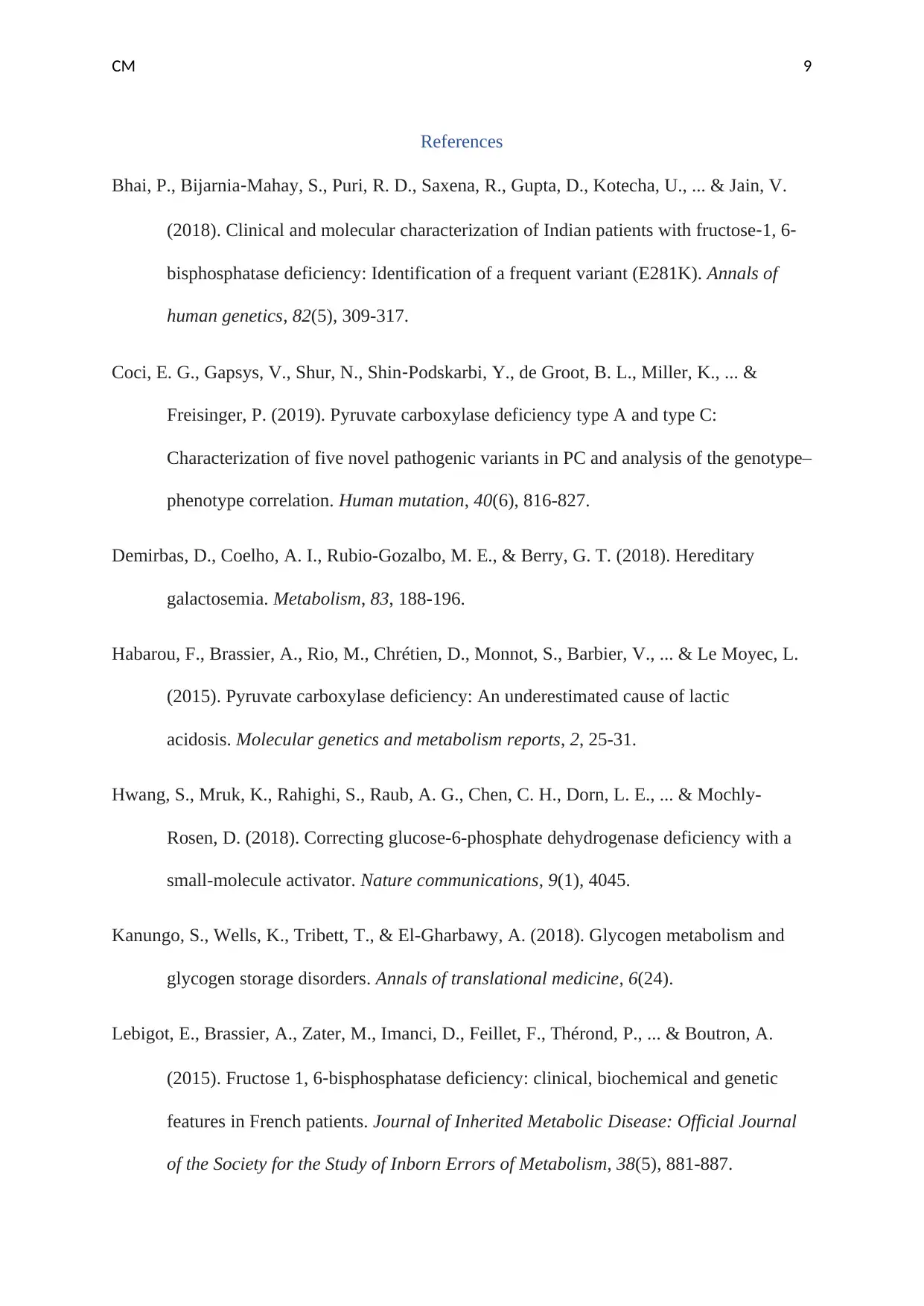
CM 9
References
Bhai, P., Bijarnia‐Mahay, S., Puri, R. D., Saxena, R., Gupta, D., Kotecha, U., ... & Jain, V.
(2018). Clinical and molecular characterization of Indian patients with fructose‐1, 6‐
bisphosphatase deficiency: Identification of a frequent variant (E281K). Annals of
human genetics, 82(5), 309-317.
Coci, E. G., Gapsys, V., Shur, N., Shin‐Podskarbi, Y., de Groot, B. L., Miller, K., ... &
Freisinger, P. (2019). Pyruvate carboxylase deficiency type A and type C:
Characterization of five novel pathogenic variants in PC and analysis of the genotype–
phenotype correlation. Human mutation, 40(6), 816-827.
Demirbas, D., Coelho, A. I., Rubio-Gozalbo, M. E., & Berry, G. T. (2018). Hereditary
galactosemia. Metabolism, 83, 188-196.
Habarou, F., Brassier, A., Rio, M., Chrétien, D., Monnot, S., Barbier, V., ... & Le Moyec, L.
(2015). Pyruvate carboxylase deficiency: An underestimated cause of lactic
acidosis. Molecular genetics and metabolism reports, 2, 25-31.
Hwang, S., Mruk, K., Rahighi, S., Raub, A. G., Chen, C. H., Dorn, L. E., ... & Mochly-
Rosen, D. (2018). Correcting glucose-6-phosphate dehydrogenase deficiency with a
small-molecule activator. Nature communications, 9(1), 4045.
Kanungo, S., Wells, K., Tribett, T., & El-Gharbawy, A. (2018). Glycogen metabolism and
glycogen storage disorders. Annals of translational medicine, 6(24).
Lebigot, E., Brassier, A., Zater, M., Imanci, D., Feillet, F., Thérond, P., ... & Boutron, A.
(2015). Fructose 1, 6‐bisphosphatase deficiency: clinical, biochemical and genetic
features in French patients. Journal of Inherited Metabolic Disease: Official Journal
of the Society for the Study of Inborn Errors of Metabolism, 38(5), 881-887.
References
Bhai, P., Bijarnia‐Mahay, S., Puri, R. D., Saxena, R., Gupta, D., Kotecha, U., ... & Jain, V.
(2018). Clinical and molecular characterization of Indian patients with fructose‐1, 6‐
bisphosphatase deficiency: Identification of a frequent variant (E281K). Annals of
human genetics, 82(5), 309-317.
Coci, E. G., Gapsys, V., Shur, N., Shin‐Podskarbi, Y., de Groot, B. L., Miller, K., ... &
Freisinger, P. (2019). Pyruvate carboxylase deficiency type A and type C:
Characterization of five novel pathogenic variants in PC and analysis of the genotype–
phenotype correlation. Human mutation, 40(6), 816-827.
Demirbas, D., Coelho, A. I., Rubio-Gozalbo, M. E., & Berry, G. T. (2018). Hereditary
galactosemia. Metabolism, 83, 188-196.
Habarou, F., Brassier, A., Rio, M., Chrétien, D., Monnot, S., Barbier, V., ... & Le Moyec, L.
(2015). Pyruvate carboxylase deficiency: An underestimated cause of lactic
acidosis. Molecular genetics and metabolism reports, 2, 25-31.
Hwang, S., Mruk, K., Rahighi, S., Raub, A. G., Chen, C. H., Dorn, L. E., ... & Mochly-
Rosen, D. (2018). Correcting glucose-6-phosphate dehydrogenase deficiency with a
small-molecule activator. Nature communications, 9(1), 4045.
Kanungo, S., Wells, K., Tribett, T., & El-Gharbawy, A. (2018). Glycogen metabolism and
glycogen storage disorders. Annals of translational medicine, 6(24).
Lebigot, E., Brassier, A., Zater, M., Imanci, D., Feillet, F., Thérond, P., ... & Boutron, A.
(2015). Fructose 1, 6‐bisphosphatase deficiency: clinical, biochemical and genetic
features in French patients. Journal of Inherited Metabolic Disease: Official Journal
of the Society for the Study of Inborn Errors of Metabolism, 38(5), 881-887.
Paraphrase This Document
Need a fresh take? Get an instant paraphrase of this document with our AI Paraphraser
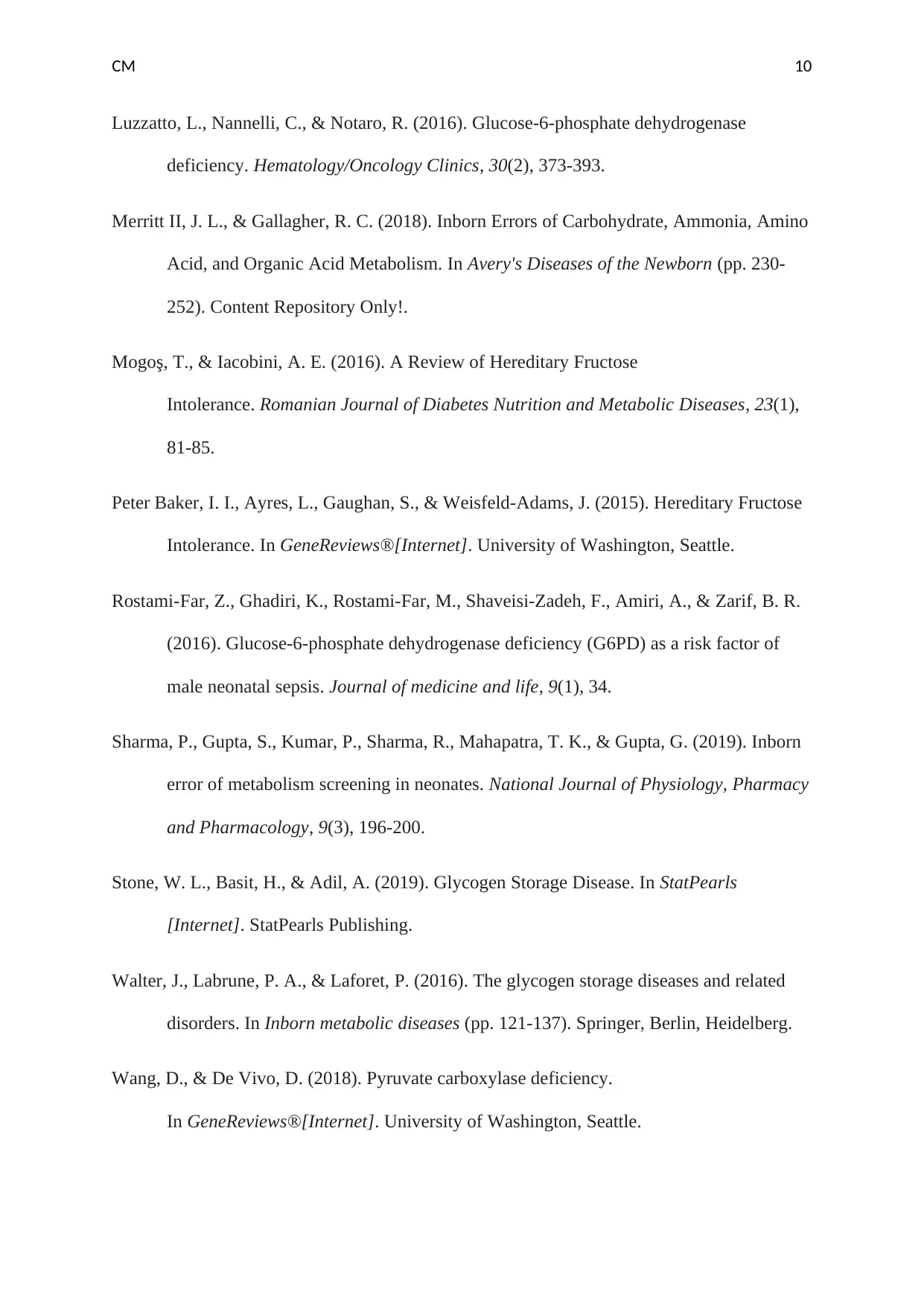
CM 10
Luzzatto, L., Nannelli, C., & Notaro, R. (2016). Glucose-6-phosphate dehydrogenase
deficiency. Hematology/Oncology Clinics, 30(2), 373-393.
Merritt II, J. L., & Gallagher, R. C. (2018). Inborn Errors of Carbohydrate, Ammonia, Amino
Acid, and Organic Acid Metabolism. In Avery's Diseases of the Newborn (pp. 230-
252). Content Repository Only!.
Mogoş, T., & Iacobini, A. E. (2016). A Review of Hereditary Fructose
Intolerance. Romanian Journal of Diabetes Nutrition and Metabolic Diseases, 23(1),
81-85.
Peter Baker, I. I., Ayres, L., Gaughan, S., & Weisfeld-Adams, J. (2015). Hereditary Fructose
Intolerance. In GeneReviews®[Internet]. University of Washington, Seattle.
Rostami-Far, Z., Ghadiri, K., Rostami-Far, M., Shaveisi-Zadeh, F., Amiri, A., & Zarif, B. R.
(2016). Glucose-6-phosphate dehydrogenase deficiency (G6PD) as a risk factor of
male neonatal sepsis. Journal of medicine and life, 9(1), 34.
Sharma, P., Gupta, S., Kumar, P., Sharma, R., Mahapatra, T. K., & Gupta, G. (2019). Inborn
error of metabolism screening in neonates. National Journal of Physiology, Pharmacy
and Pharmacology, 9(3), 196-200.
Stone, W. L., Basit, H., & Adil, A. (2019). Glycogen Storage Disease. In StatPearls
[Internet]. StatPearls Publishing.
Walter, J., Labrune, P. A., & Laforet, P. (2016). The glycogen storage diseases and related
disorders. In Inborn metabolic diseases (pp. 121-137). Springer, Berlin, Heidelberg.
Wang, D., & De Vivo, D. (2018). Pyruvate carboxylase deficiency.
In GeneReviews®[Internet]. University of Washington, Seattle.
Luzzatto, L., Nannelli, C., & Notaro, R. (2016). Glucose-6-phosphate dehydrogenase
deficiency. Hematology/Oncology Clinics, 30(2), 373-393.
Merritt II, J. L., & Gallagher, R. C. (2018). Inborn Errors of Carbohydrate, Ammonia, Amino
Acid, and Organic Acid Metabolism. In Avery's Diseases of the Newborn (pp. 230-
252). Content Repository Only!.
Mogoş, T., & Iacobini, A. E. (2016). A Review of Hereditary Fructose
Intolerance. Romanian Journal of Diabetes Nutrition and Metabolic Diseases, 23(1),
81-85.
Peter Baker, I. I., Ayres, L., Gaughan, S., & Weisfeld-Adams, J. (2015). Hereditary Fructose
Intolerance. In GeneReviews®[Internet]. University of Washington, Seattle.
Rostami-Far, Z., Ghadiri, K., Rostami-Far, M., Shaveisi-Zadeh, F., Amiri, A., & Zarif, B. R.
(2016). Glucose-6-phosphate dehydrogenase deficiency (G6PD) as a risk factor of
male neonatal sepsis. Journal of medicine and life, 9(1), 34.
Sharma, P., Gupta, S., Kumar, P., Sharma, R., Mahapatra, T. K., & Gupta, G. (2019). Inborn
error of metabolism screening in neonates. National Journal of Physiology, Pharmacy
and Pharmacology, 9(3), 196-200.
Stone, W. L., Basit, H., & Adil, A. (2019). Glycogen Storage Disease. In StatPearls
[Internet]. StatPearls Publishing.
Walter, J., Labrune, P. A., & Laforet, P. (2016). The glycogen storage diseases and related
disorders. In Inborn metabolic diseases (pp. 121-137). Springer, Berlin, Heidelberg.
Wang, D., & De Vivo, D. (2018). Pyruvate carboxylase deficiency.
In GeneReviews®[Internet]. University of Washington, Seattle.
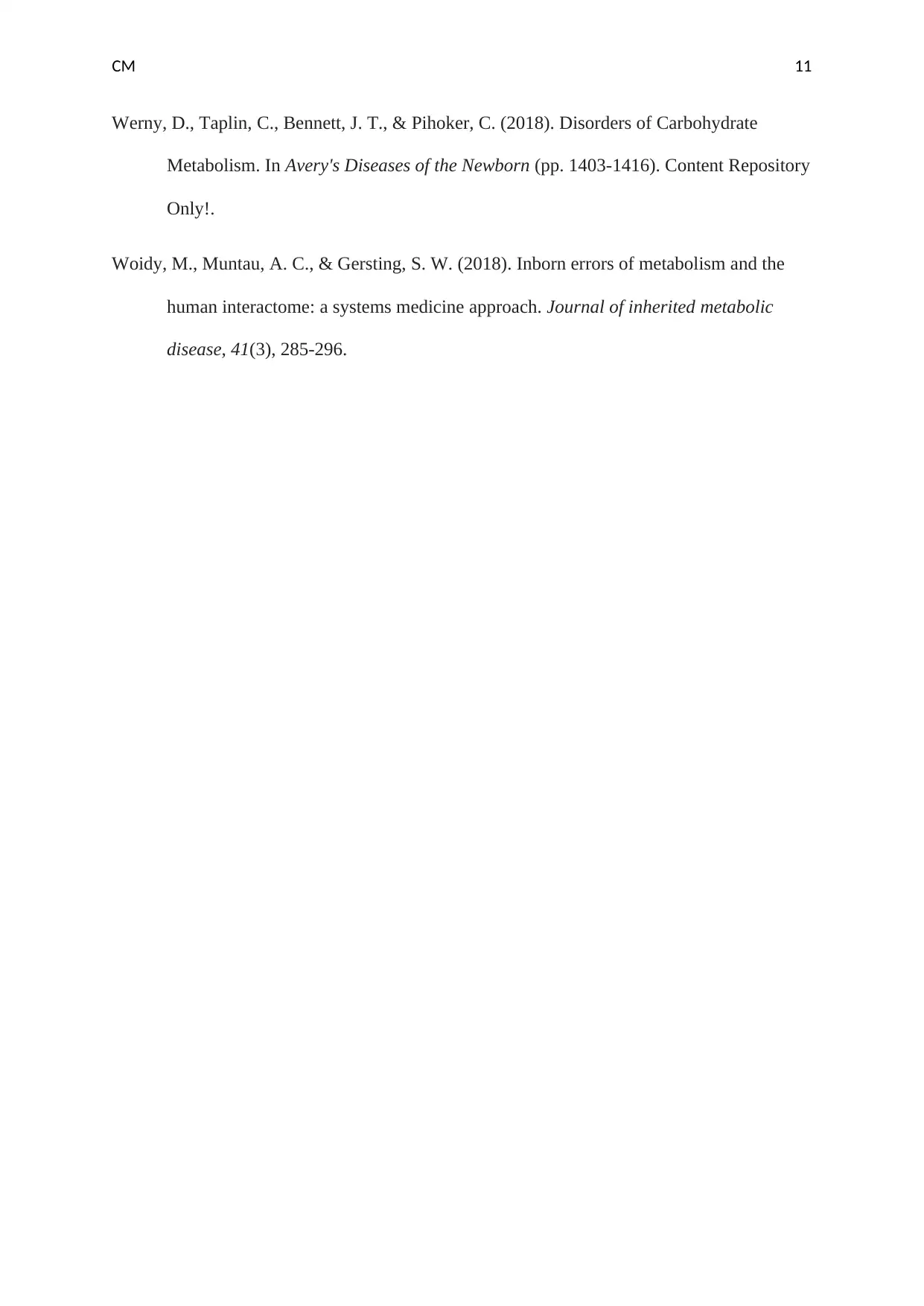
CM 11
Werny, D., Taplin, C., Bennett, J. T., & Pihoker, C. (2018). Disorders of Carbohydrate
Metabolism. In Avery's Diseases of the Newborn (pp. 1403-1416). Content Repository
Only!.
Woidy, M., Muntau, A. C., & Gersting, S. W. (2018). Inborn errors of metabolism and the
human interactome: a systems medicine approach. Journal of inherited metabolic
disease, 41(3), 285-296.
Werny, D., Taplin, C., Bennett, J. T., & Pihoker, C. (2018). Disorders of Carbohydrate
Metabolism. In Avery's Diseases of the Newborn (pp. 1403-1416). Content Repository
Only!.
Woidy, M., Muntau, A. C., & Gersting, S. W. (2018). Inborn errors of metabolism and the
human interactome: a systems medicine approach. Journal of inherited metabolic
disease, 41(3), 285-296.
⊘ This is a preview!⊘
Do you want full access?
Subscribe today to unlock all pages.

Trusted by 1+ million students worldwide
1 out of 12
Your All-in-One AI-Powered Toolkit for Academic Success.
+13062052269
info@desklib.com
Available 24*7 on WhatsApp / Email
![[object Object]](/_next/static/media/star-bottom.7253800d.svg)
Unlock your academic potential
Copyright © 2020–2025 A2Z Services. All Rights Reserved. Developed and managed by ZUCOL.


